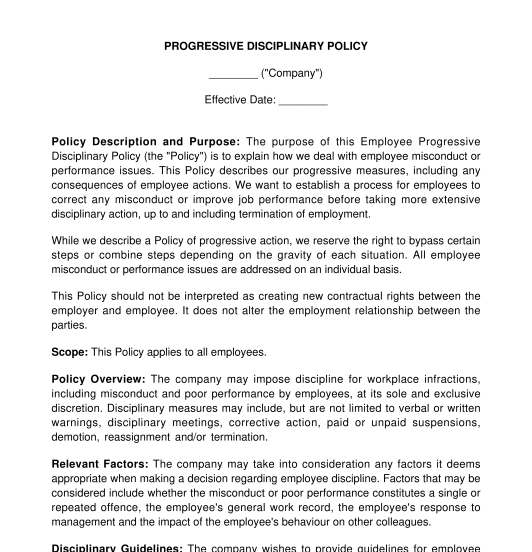 24/09/2025
24/09/2025

Answer a few questions and your document is created automatically.

Your document is ready! You will receive it in Word and PDF formats. You will be able to modify it.

 24/09/2025
24/09/2025
 Word and PDF
Word and PDF
 3 to 5 pages
3 to 5 pages
A progressive employee discipline policy is a company-wide document by which an employer outlines its policy regarding poor behaviour and poor performance by its employees. The document lists the series of steps the employer must take to address employee misconduct.
The progressive approach means that each step becomes more severe than the last.
No. Having a progressive disciplinary policy is not mandatory, but it's a useful policy to have and implement to remind upper management that disciplining an employee needs to be done based on successive steps with an increase in the degree of severity.
Like this Hiring Policy, there are many varying workplace policies, including an Occupational Health and Safety Policy, a Vacation Policy, a Workplace Social Media Policy, a Workplace Technology Security Policy, and more.
A progressive disciplinary policy should contain the disciplinary measures imposed by the employer and the order of severity. For example:
Outlining the disciplinary measures may be useful in a subsequent court proceeding if the employee files a lawsuit against the employer. The policy showcases each step it took before terminating an employee.
There is no set duration of an employment policy as they normally subsist for the duration of the lifetime of the employer's organization. In other words, the duration is indefinite. However, policies must be amended to reflect the changes in legislation and should be refined to adapt to industry standards.
Once the progressive disciplinary policy is ready, the employer must deliver it to employees. If the employer has a physical office location, keep a copy of the Policy in a conspicuous place in the event employees also have the option of going to the office.
Employers should include this Policy in a new employee's welcome package to ensure they are familiar with workplace protocol and avoid any future doubt that they were unaware of a specific rule or company policy.
When significant changes arise in the Policy, the employer should provide a copy of the new policy to all staff in a timely manner.
Employees should also sign the acknowledgement, either electronically or physically, at the end of the document confirming they read and understand the policy. The employer should then add a copy of the signed Policy to each employee's file. As stated in the Policy, employees will be made aware that non-compliance with the document may lead to termination of employment.
Employment policies must be consistent with the law. In Canada, employment law is governed by legislation and case law. The following pieces of legislation govern employment law:
Ontario: Employment Standards Act, 2000, S.O. 2000, c. 41
Alberta: Employment Standards Code, RSA 2000, c E-9
British Columbia: Employment Standards Act, RSBC 1996, c 113
Saskatchewan: The Saskatchewan Employment Act, SS 2013, c S-15.1
Manitoba: The Employment Standards Code, CCSM c E110
Quebec: Act respecting labour standards, CQLR c N-1.1
New Brunswick: Employment Standards Act, SNB 1982, c E-7.2
Nova Scotia: Labour Standards Code, RSNS 1989, c 246
Prince Edward Island: Employment Standards Act, RSPEI 1988, c E-6.2
Northwest Territories: Employment Standards Act, SNWT 2007, c 13
Nunavut: Labour Standards Act, RSNWT (Nu) 1988, c L-1
Yukon: Employment Standards Act, RSY 2002, c 72
Newfoundland and Labrador: Labour Standards Act, RSNL 1990, c L-2
Canada: Canada Labour Code, RSC 1985, c L-2
It's also important to note that suspensions without pay are risky and may lead to a lawsuit by the employee.
You fill out a form. The document is created before your eyes as you respond to the questions.
At the end, you receive it in Word and PDF formats. You can modify it and reuse it.
Progressive Disciplinary Policy - Sample, template
Country: Canada (English)